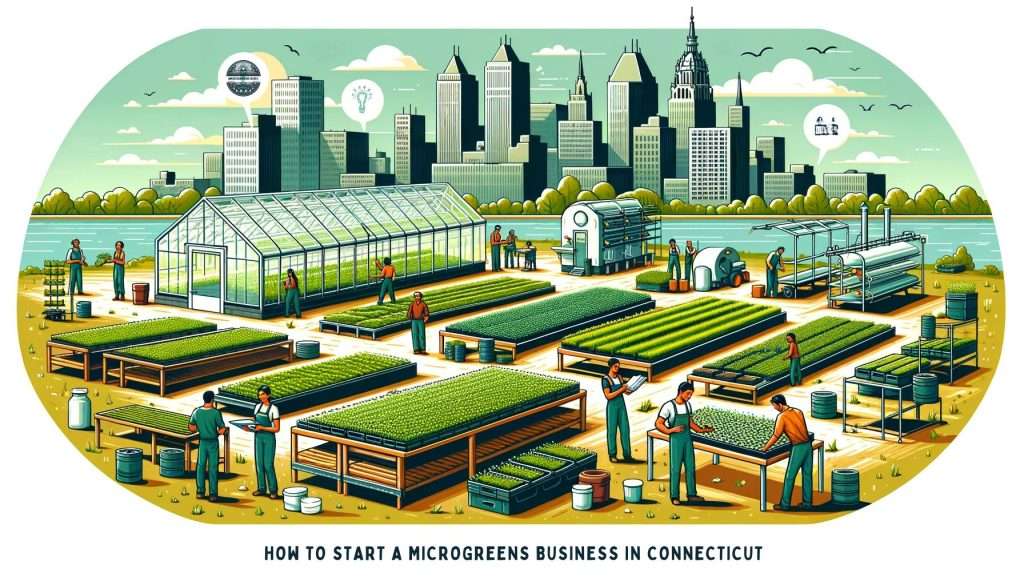Selling Microgreens in Connecticut: An All-inclusive Guide to Profits and Growth
Some of our posts on Microgreensguru.com contain affiliate links. If you click on an affiliate link and make a purchase, we may receive a commission. Clicking on an affiliate link that earns a commission does NOT result in additional charges or costs you extra. Earnings from affiliate links help keep this website running. See our full affiliate disclosure here.
Microgreens are tender young edible greens harvested in the early stages of plant growth, typically 1–3 weeks after germination. They have gained immense popularity in recent years due to their concentrated flavors, vivid colors, and exceptional nutritional content. Microgreens contain up to 40 times higher levels of vital nutrients compared to their mature plant counterparts. Their concentrated nutrition and intense flavors have made them a highly desirable ingredient for chefs and home cooks alike.
Connecticut presents an excellent opportunity for farmers and entrepreneurs looking to start a microgreens business. The state has a strong local food movement focused on healthy, nutrient-dense foods. Connecticut consumers are increasingly seeking out fresh, organic produce from local sources. Microgreens allow year-round local production and align well with consumer preferences. They can be grown indoors hydroponically, providing farmers and food entrepreneurs flexibility. Connecticut also has niche farmers markets, high-end restaurants, and direct-to-consumer channels ideal for selling premium microgreens.
Table 1: Common Microgreen Varieties
| Variety | Flavor Profile |
| Arugula | Peppery, spicy |
| Basil | Sweet, aromatic |
| Beets | Earthy, sweet |
| Broccoli | Mild, crunchy |
| Cabbage | Fresh, crisp |
| Chard | Hearty, earthy |
Key Takeaways
- Microgreens are nutrient-dense greens harvested just after sprouting that chefs and consumers increasingly seek out.
- Connecticut’s cottage food laws allow for home-based commercial production and direct sales of approved non-potentially hazardous foods like microgreens.
- Licensing, permitting, zoning, labeling, and inspection regulations must be followed to legally sell microgreens from home in Connecticut.
- Allowed sales avenues include farmers markets, online, and direct from your home or farm stand. Wholesale and retail sales are not permitted.
- Proper training in food safety and sanitation practices helps mitigate risks when producing food at home.
- Sales taxes, business insurance, legal business formation, and record keeping are key operational considerations when starting a microgreens business.
- Conduct market research, create a business plan, complete licensing steps, and focus on networking and marketing when launching a new microgreens venture.
- With preparation and compliance, Connecticut’s environment provides a promising opportunity for home-based microgreens businesses to thrive.

Why Connecticut Offers Opportunities for Microgreens Businesses
- Strong interest in local, organic, nutrient-dense foods
- High-end restaurants seeking unique ingredients like microgreens
- Niche farmers’ markets supportive of small-scale producers
- Allows year-round indoor production with hydroponics
- Direct-to-consumer sales channels readily available
This guide aims to provide aspiring microgreen growers and sellers with the information needed to legally start and operate a microgreen business in Connecticut. It covers key regulations like cottage food laws and licensing requirements. It also offers guidance on production, sales venues, food safety, taxes, insurance, and more. With proper planning and preparation, the microgreens niche provides a promising business model for the enterprising farmer in Connecticut.
Purpose of Our Guide: Legally Starting a Microgreens Business in Connecticut
- Understand Connecticut’s cottage food laws pertaining to microgreens
- Learn licensing and permitting requirements
- Identify approved sales channels – farmers markets, online, direct
- Follow food safety rules and facility guidelines
- Learn tax, insurance, and legal business entity considerations
- Gain actionable steps and advice for starting up
By clearly outlining both opportunities and regulatory hurdles, this guide empowers farmers, food entrepreneurs, and small business owners to successfully establish a compliant microgreens operation in Connecticut. It provides a roadmap to building a thriving local microgreens venture from the ground up.

Connecticut Cottage Food Laws and Microgreens
Connecticut has specific cottage food laws that dictate what types of foods can be produced in a home kitchen and sold directly to consumers. These laws aim to balance food safety and small business opportunities. It is important for microgreen growers to understand where their products fit within the state’s cottage food framework.
Table 2: Connecticut Cottage Food Sales Limits
| Item | Limit |
| Annual Revenue | $50,000 |
| Individual Sale Transaction | $250 |
Overview of Connecticut’s Cottage Food Laws
Connecticut’s cottage food laws allow for the production and sale of non-potentially hazardous foods. These are foods that do not require refrigeration for safety and have a low risk of causing foodborne illnesses. The law places restrictions around allowed foods, sales venues, and total revenue. Sellers must also comply with labeling and licensing requirements.
Microgreens qualify as permitted cottage foods in Connecticut provided proper growing and handling procedures are followed. They are considered non-potentially hazardous and not chemically altered. This provides a pathway for small-scale commercial production out of a home kitchen.
How Microgreens are Classified and Permitted Under the Laws
- Considered non-potentially hazardous foods by the Department of Consumer Protection
- Do not require time or temperature control for safety
- Allowed as fresh fruits and vegetables under the cottage food law
- Permit home-based commercial production and direct sales
It is important to note that only specific microgreen varieties are allowed. Sprouted seeds and microgreens fall under produce handling laws in Connecticut. Certain seeds intended for microgreen production are prohibited for safety reasons. Consult the Department of Agriculture for the most up-to-date seed guidance.
Important Restrictions and Sales Limits to Know
- $50,000 maximum annual gross sales
- No wholesale, retail, or restaurant sales permitted
- Delivery directly to consumers only within state borders
- Production is limited to home kitchens only
Exceeding the $50,000 sales cap requires obtaining a commercial food manufacturing license. Consult the Department of Consumer Protection for more information on licensing.
Reporting Requirements for Microgreens Sellers
- Must maintain sales records and be prepared to provide proof of sales
- Keep documentation that the business complies with local zoning
- Submit water testing results annually if using a private well
- Food safety re-inspection may be required every 3 years
Thorough record-keeping provides transparency and accountability. It also helps demonstrate compliance with Connecticut’s cottage food laws.

Licensing and Regulations for Selling Microgreens
While Connecticut’s cottage food law creates an opportunity for home-based microgreens businesses, there are still important licensing and regulatory requirements to fulfill. Navigating the registration process and complying with state and local laws ensures your business operates legally.
Necessary Business Licenses and Permits
- Cottage Food Manufacturing License: Required for all cottage food producers selling directly to consumers. $50 annual fee.
- Sales Tax Permit: Required if making over $100,000 in annual sales. Collects 6.35% state sales tax.
- Local Business License: Some municipalities require a business license to operate. Check with the town hall.
- Weights & Measures Device License: Needed if selling by weight using a commercial scale. $50 annual fee.
Failure to obtain the necessary state licenses and permits can result in financial penalties. They legitimize microgreens businesses operating under the cottage food law.
Registration and Licensing through the eLicense System
- Apply for a Cottage Food Manufacturing License via the eLicense portal
- Submit the license application form and pay the $50 fee
- Pass the food safety exam and pay a $15 fee
- Undergo home kitchen inspection
- Renew license annually through the eLicense system
The eLicense portal streamlines and digitizes the application and renewal process. It provides a transparent chain of documentation for regulators.
Zoning Laws and How They Affect Microgreens Businesses
- Home-based businesses permitted in most residential zones
- Limits on signage, employees, deliveries, and more based on zoning
- Detached sheds or greenhouses may require additional permitting
- Verify compliance with the municipal planning/zoning department
Check your local zoning ordinances to ensure your microgreens cottage business aligns with regulations for home occupations. Non-compliance could lead to municipal fines.
Requirements Like Kitchen Inspections and Water Testing
- Home kitchen must pass inspection prior to licensing
- Private well water must be tested annually for safety
- Additional building permits needed for major renovations
- Onsite re-inspection is required every 3 years
- The inspector may request access at any time
Maintaining proper food safety and storage practices will help pass inspections. Keep all business records organized for easy access during audits.
Approved Microgreens Sales Venues in Connecticut
Connecticut’s cottage food law allows microgreens producers to sell directly to consumers through certain approved channels. However, major retail outlets and wholesale opportunities are prohibited under the current regulations.
Farmers Markets, Online, and From Home Allowed
- Selling at farmer’s markets is a popular option
- Online ordering with direct delivery to customers permitted
- Can also sell directly from your home or farm stand
These direct-to-consumer pathways enable developing microgreen businesses to establish a local customer base. Many successful operations start at farmer’s markets.
Rules for Delivering Microgreens
- You or an employee must do deliveries within state borders
- No mailing or shipping of microgreens across state lines
- Delivery days and range may be restricted by local ordinances
- Must have cottage food license and label when delivering
Arrange delivery days based on your microgreen harvest schedule. Focus deliveries in your immediate area first before expanding.
Retail Stores and Restaurants Not Approved Venues
- Cannot sell microgreens to grocery stores or specialty retailers
- No wholesaling of microgreens to distributors or restaurants
- Sales must be direct to end consumers only
If you wish to wholesale microgreens in the future, a commercial food manufacturing license will be required once the $50,000 sales limit is exceeded.

Food Safety Considerations for Microgreens
Although microgreens are considered a low-risk food, Connecticut cottage food producers should still follow key food safety practices when growing and selling them from home. This protects public health and maintains compliance with state regulations.
Table 4: Microgreens Production Steps
| Step | Description |
| 1. Seed Selection | Choose seed varieties to grow |
| 2. Seed Sanitation | Disinfect seeds to kill pathogens |
| 3. Seed Soaking | Soak seeds to initiate germination |
| 4. Seed Planting | Plant seeds thickly in trays |
| 5. Seed Germination | Seeds sprout and the first leaves emerge |
| 6. Growth & Light | Provide light and airflow for growth |
| 7. Harvesting | Cut microgreens when leaves reach the target height |
| 8. Washing & Drying | Wash and dry harvested microgreens |
| 9. Packaging & Labeling | Package microgreens and add labels |
Following Connecticut Labeling Requirements
Clear labeling provides transparency for microgreen customers. All packages must include certain information like the business name and address, ingredients, net weight, allergen warnings if applicable, and a statement indicating the food was made in a cottage food operation. Detailed records of all food labels must be kept on file. Proper labeling gives customers important product details and allows issues to be traced back if needed.
Training in Food Handling and Preparation
Microgreens sellers should complete an approved food safety training course focused on proper handling, sanitation, and storage of ingredients and finished products. It is also important to maintain diligent personal hygiene practices in the home kitchen like handwashing, avoiding cross-contamination, and illness exclusion. Fresh produce destined for microgreens should be thoroughly washed following established protocols. Dedicated equipment and utensils designated only for microgreens limit risks as well. Ongoing training establishes a strong culture of food safety knowledge.
Facilities and Equipment Guidelines
The kitchen and any space dedicated to microgreens should only use food-grade containers, utensils, and surfaces approved for direct food contact. All equipment must be thoroughly cleaned and sanitized according to written procedures. Adequate lighting, ventilation, and air circulation aid in safe food production. Microgreens workspaces should be separated from domestic living spaces as much as possible. Following guidelines for an appropriate food preparation environment reduces hazards.
Mitigating Contamination Risks
Microgreens sellers should develop standard operating procedures to avoid biological cross-contamination and minimize food safety hazards. This includes excluding domestic pets from microgreen areas and implementing an integrated pest management program. Sick family members should also be restricted from food preparation areas. The microgreens process flow should prevent cross-contamination from unsafe foods. Finally, well water should be tested annually for contaminants like coliforms and E. coli to verify potability if used for washing and irrigation. Being proactive against risks is key to success.
Taxes, Insurance, and Other Considerations
A microgreens business in Connecticut involves important tax, insurance, liability, and legal formation factors beyond core licensing and food safety regulations. Understanding these operational aspects is vital for success.
Table 3: Recommended Business Insurance
| Insurance Type | Purpose |
| General Liability | Protects against liability claims |
| Product Liability | Protects against food safety claims |
| Commercial Property | Covers business assets |
| Vehicle | Covers delivery vehicles if applicable |
Collecting Sales Tax
Connecticut levies a 6.35% statewide sales tax on all goods. Once a microgreens business exceeds $100,000 in annual revenue, they must register for a tax permit to charge, collect, and remit appropriate sales tax. This involves integrating sales tax calculations into pricing and using accounting software to automatically apply and track it with each transaction. Keeping diligent records ensures accurate tax payments.
Recommended Business Insurance Coverage
Microgreens sellers should strongly consider business insurance coverage like general liability, product liability, commercial property, and vehicle insurance if applicable. General liability protects against third-party claims of bodily injury or property damage while product liability shields against foodborne illness lawsuits. Commercial property insurance covers any business equipment, structures, and inventory. Having adequate insurance reduces the financial risks associated with a new venture. Work with an agent to determine ideal coverage limits based on your specific operation.
Record-keeping and Reporting Requirements
Detailed record keeping is imperative for microgreens businesses. All sales receipts, costs of goods sold, expenses, income, profit, and loss must be tracked. These records must be maintained for a minimum of three years and used for filing Schedule C business taxes with your annual personal income tax return. While tedious, solid bookkeeping habits not only satisfy regulators but provide useful business insights.
Pros and Cons of Forming a Legal Business Entity
Forming a formal legal business entity like an LLC provides liability protection by separating personal and business assets. However, it also involves increased legal obligations, state filing fees, paperwork, and tax documentation. For very small cottage microgreen businesses just starting out, a formal legal structure may be unnecessary. But it can provide credibility and limit risk as you scale. Weighing the pros and cons helps determine the ideal business formation.
Final Thoughts on Getting Started Selling Microgreens in Connecticut
For aspiring microgreens entrepreneurs, Connecticut offers an appealing market and regulatory environment to start a cottage food business. With proper planning and preparation, a microgreens venture can be highly viable in the state.
Critical first steps include researching consumer demand, analyzing competition, and interviewing potential buyers. This due diligence helps determine if a microgreens business can be profitable and sustainable in your area. You can assess local interest by offering free samples and interacting with shoppers at farmer’s markets and events.
Once confident in the opportunity, creating a detailed business plan and budget provides an important roadmap. This should outline your full process from sourcing seeds to planting, harvesting, packaging, and sales. Make thoughtful financial projections including costs, expected revenue, target pricing, and funding needed.
Methodically completing legal licensing and registration steps is also vital for getting started. Submit your cottage food application, pass the exam, ready your home kitchen for inspection, create compliant labels, and secure liability insurance. Taking the proper time to follow requirements prevents delays in launching.
Early promotion and networking build an initial customer base. Introduce your microgreens at markets and local happenings. Promote online and offer free samples to generate buzz. Partner with chefs, cafes, juice bars, and health food stores to foster steady B2B and B2C relationships. Provide top-notch products and customer service.
Connecticut’s expanding cottage food laws create new opportunities for fresh microgreens. Follow this guide to legally establish your home-based microgreens farm or food business. With preparation and hard work, a profitable venture can flourish. If you have questions about selling microgreens in other states, please take a look at our guide to selling microgreens in the US.
Frequently Asked Questions Related to Selling Microgreens in Connecticut

Cal Hewitt is the Founder and Lead Cultivator at Microgreens Guru, a website dedicated to empowering individuals to grow, consume, and potentially sell nutrient-dense microgreens. With 5 years of hands-on experience in microgreens cultivation, Cal brings a unique analytical perspective to the world of urban agriculture. He specializes in optimizing growth techniques for various microgreen varieties, while also focusing on sustainable and cost-effective growing methods. Cal’s passion for microgreens, ignited by a personal health journey, drives him to continuously explore and share innovative approaches to microgreens cultivation. His practical experience, combined with his commitment to education through his website and upcoming book, ensures that Microgreens Guru remains a valuable resource for both novice and experienced growers alike.







